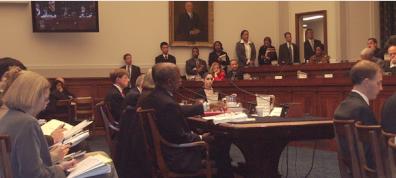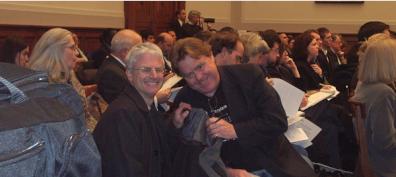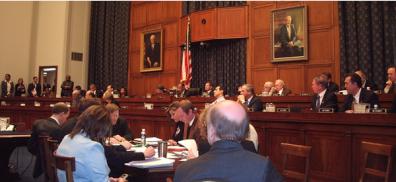Blogging from Hearings on Bush's Signing Statement
Live Blogging from House Judiciary Committee Hearings on Bush's Signing Statements
By David Swanson
http://www.afterdowningstreet.org/signing
Open this article for blogging, beginning at 10:15 a.m. ET.
10:13 a.m. I'm in the room, but you can view a live webcast here. I've just been handed hardcopies of the upcoming witness statements. If you can find them online anywhere, please post a link beneath this article.
10:15 a.m. Witness list:
John Elwood, Deputy Assistant Attorney General, U.S.
Dept. of Justice
Hon. Mickey Edwards, former member of
Congress, Aspen Institute
Karen J. Mathis, President,
American Bar Association
Professor Nicholas Quinn
Rosenkranz, Assoc. Professor of Law, Georgetown University
Law Center
Professor Charles Ogletree, Jesse Climenko
Professor of Law, Harvard Law School

Click for big version
10:25: Elwood is going to claim that Bush uses signing statements "occasionally, and in a manner "indistinguishable from that of previous presidents. He is going to claim that Congress has been passing bills that unconstitutionally restrict the pool from which the president may select candidates for positions and that unconstitutionally require approval of a law by a committee, but what do these examples have to do with the signing statements on torture, spying, letter-reading, funding the war, etc., etc.
Conyers opened by honoring Father Drinan.
10:31: Conyers' opening statement is excellent. He's reading it as prepared:
"This president has tried to take unto himself absolute authority on issues such as surveillance, privacy, torture, enemy combatants, and rendition…."
Conyers says he will demand an explanation for each signing statement, including those on torture, opening mail,
Will ask his staff and Ranking Member Smith's staff to meet with the Dept. of Justice on this.
AND I HOPE he will ask Elwood today.
Conyers cites 141 signing statements reversing over 800 provisions.
ABA finds this contrary to the rule of law and the Constitutional separation of powers.
"…systematic, extraconstitutional mode of conduct by the White House…
10:36: Ranking member Lamar Smith claims that Bush's signing statements are legal and that no court has said otherwise, and that Hamdan v Rumsfeld notably ignored signing statements.
Smith cites a CRS report that indicates that signing statements do not alter the meaning of laws. (But then Bush's behavior has been contrary to many laws.)
Claims noone can cite a single instant in which Bush has violated a law (!!). (Bush himself says he violated FISA.)
Claims this is all about policy disagreements. (But how has Bush changed policies of laws without violating or altering those laws?)
10:40: Dem. Rep. Jerrold Nadler cites ruling that President cannot alter laws, and cites US Constitution on roles of government's branches.
President has gone "from arrogance to lawlessness." Example of FISA violations and signing statement. FISA violations are felonies. Statute of limitations runs considerably beyond the lifetime of this Administration.
10:43: Rep. Rep. Franks cites presidential oath and claims it requires president to refuse to enforce unconstitutional statutes. Cites Clinton lawyers, claims Clinton issued 391 signing statements, claims signing statements are and should be more common in "times of war," cites Lawrence Tribe.
10:44: Conyers said additional statements could be submitted in writing. A Republican objected, and Conyers cited 40-years of tradition. Experience and knowledge are powerful things. Conyers is introducing the witnesses now.
10:48: after a brief summary of his statement from Ellwood, Edwards began. He nailed it. This is not like previous presidents' use of signing statements.
10:55: If agencies refuse to inform the Congress, as the AG just did on FISA, how can Congress know whether violations are occuring? And Presidential assertions to not be bound by the war, must be challenged or they become precedent.
I agree with most of this president's positions. I may not agree with those of the next president.
"..the Congress of the United States will become irrelevant and the basic structure of American government will have been fundamentally changed…."

Click for big version
That's Bob Fertik of Democrats.com and Tim Carpenter of Progressive Democrats of America
11:00 Mathis says ABA's unanimous decision is that Bush is violating the law.
President is usurping the power of the legislative branch by denying the Congress the opportunity to override a veto.
Mathis made sensible recommendations for how signing statements SHOULD be used.
Rosenkranz agrees with Elwood. This is a "balanced" hearing. If the news reports will be anything else, it will be either because of what happens in the Q and A or because the media miraculously defers to Congressional authority of Democrats the way it has for Republicans.
Notes that Rep. Shiela Jackson Lee has introduced a bill on this topic. Claims that banning use of funds for signing statements is unconstitutional, as well as every other section of the bill.
11:07: Ogletree began: honored Father Drinan. Speaks favorably of Jackson-Lee's bill and Sen. Arlen Specter's.
Ogletree says the numbers are:
1100 provisions
challenging laws
Over 150 signing statements
Number of vetoes: Clinton 37, Bush I. 44, Bush II. 1
Ogletree says
the numbers are:
1100 provisions challenging laws
Over
150 signing statements
Number of vetoes: Clinton 37, Bush I. 44, Bush II. 1
Defense Appropriation Bill banned torture. Bush's statement made clear he would not be bound by that.
Atomic Energy Act. Indian Government interpreted the law based on Bush's signing statement. Governments are now confused as to what our laws are, and must fear that a new president will change the law.
Ability to read the mail another example.
11:12: Conyers to Elwood: A signiong statement allows Bush to withold information from Congress. Has Admin witheld any information?
Elwood: No.
Conyers cites 148 signing statements.
11:20: Smith dwells on lack of court rulings on this topic.
11:25: Nadler asks how a President can enforce a law he sees as unconstitutional. Nadler also grills Mathis. Nadler asked Elwood whether DOJ was issuing statements about each signing statement, as required – Nadler says – by law. Elwood said no. And asked Elwood to justify the secrecy involved in not issuing statements.
Sensenbrenner says signing statements no big deal even though extra-constitutional, as are committee statements. Cites Tribe (again) and submits his op-ed from the Globe.
11:40 Bobby Scott (Dem, Virginia) asking witnesses whether Prez should enforce an unconstitutional section of a bill he signs. Witnesses insist he violates his oath if he signs the bill.
Can Congress create a court case prior to the President acting based on a signing statement? One witness said no. (But if President's actions are secret, isn't that carte blanche?)
11:41: Adjourned until 12:30
PART II:
Started back up at 12:47 p.m.
In part I Sensenbrenner had claimed the ABA cited an inaccurate Globe article, Now Rep. Coble harps on that, but during the recess Mathis looked it up and now clarifies that the article quoted from was accurate. Sensenbrenner, having invented a goofy charge, is now not in the room.
Sparse attendance now.
12:56 Mel Watt speaking, asking Elwood what if anything president has done (answer now or submit later) after signing bill requiring hiring practices to diversify the intelligence community in terms of race and sex.
1:05: Rep Feeney asking questions now, but this is growing repetitive.
Feeney asked Elwood what remedy the public or Congress has if a President refuses to enforce part or all of a law, whether or not a signing statement announces the president's refusal to enforce the law?
Elwood replied: file a suit.
1:07: Votes are continually being called, interrupting the hearings. (Who is controlling that?) And a woman from the audience just got up and spoke for 5 minutes until Conyers asked her to sit down. She wanted to know where the missing members were and why chekcs and balances were not being enforced. There are two police officers at the door now.
1:09 Shiela Jackson Lee is speaking: blocking use of veto and override of veto is unconstitutional, and signing statement on torture is dangerous. If Congress has right to cut off funds of a war, Constitution has clear power over appropriations. J-Lee stressed significance of ABA report and helpfulness of their recommendations.
1:15 Conyers raises suspicion that it is the subject of this hearing that is behind the repeated calls for votes.
We're in recess again for another vote.
Endless vote interruptions and no subpoenas. It's just like when the Dems were in the minority -- except that then Conyers didn't invite right-wing nuts to testify. I guess he can't keep them out now, but he could put them under oath and has not done so. He could also subpoena Addington, Yoo, Cheney, ....
1:41 back and rep. Lungren defending signing statements. Mathis explaining that the equivalent of a line-item veto is as illegal as a line-item veto.
1:46 When a Dem member got a turn, he asked Lungren a question, and he got to run his mouth for 5 more minutes.
1:54 Rep Forbes (Repulican of Virginia) talking nonsense. Other members asking if they can speak soon since they've come back 4 times and more votes are likely.
2:01 Forbes asked Mathis whether the ABA looked into Clinton's signing statements during his presidency. She said no, and failed to explain what the difference was. Lori Perdue, who was sitting in the front row of the audience, stood up and shouted "What difference does it make what happened then? This is a subversion of the rule of law!" Conyers asked the police to escort her out.
2:02: Freshman Democrat Johnson refused to yield to Schiff and other member who are getting impatient, and said he'd be brief, but then slowly thanked the witnesses for coming, etc., but asked no question, so it was fairly brief.
2:04 Rep Franks got to speak again and claimed that opposing signing statements is suppressing the president's right to freedom of speech (!!).
2:06 Edwards made good point that this hearing is about presidential assertions to be above the rule of law and to shape laws without any recourse, whereas with a veto there is a recourse (overriding the veto).
Franks asked if there is recourse in the courts. Rosenkranz claimed there was.
2:10 Schiff finally got to ask his question and asked about the PATRIOT Act reauthorization. Sections 106a and 119 were unchanged in the reauthorization. The AG testified "ad nauseam" on the importance of oversight, but preisdent used a signign statement to reject those sections and 756e2 as well. Please answer today or later: has the executive branch withheld information from Congress as a result of this signing statement eliminating the requirement to inform Congress? And how are we to know what the president is doing if you arrogate to yourself the power to decide what falls under your authority.
Elwood claims Bush is complying with the law fully, despite the signing statement. Elwood is not under oath. Even so, he refuses to give a straight answer to the question. Finally Elwood says no, the president has not witheld anything, and claims that if anything were withheld the administration would so inform Congress.
2:16 Goodlatte blathering.
2:20 Elwood claims that Bush supported ban on torture before and after it passed and wrote signing statement throwing it out purely to assert White House power.
2:22 Artur Davis finally gets to ask his question. On FISA violation signing statement, he points out that the media, not the president, informed Congress what the president was doing. Is it Elwood's position that if the president thinks a law unconstitutional he should not follow it?
Elwood: yes.
Davis says Alabama had a Governor once who thought letting black people vote was unconstitutional. How is that different from the president's position?
Elwood won't answer.
Davis asks again.
Elwood says governors are subject to federal law.
Davis asks whether president is not subject to the law as well?
Elwood says only if the Supreme Court has ruled.
Davis: why would the president's interpretive power exceed the congress's?
Elwood: hemming and hawing
SHEESH!
at least that was decent questioning -- when will conyers get in on the act again? does he have to let everyone else speak and some multiple times first?
2:30 Republican Rep. Gohmert is reading Clinton signing statements, as if anything Clinton did is just and legal. This from the party that lynched him. There are three members of each party left here and one corporate reporter that I can identify.
Wasserman Schultz is upbraiding the Republicans for never holding a hearing like this one. Asking Elwood about a bill that required the president to adhere to certain qualifications in appointing a FEMA administrator. Bush's signing statement said that the executive branch "shall" -- not might – interpret that section of the bill in a way different from what the Congress passed.
Elwood claims president gets to interpret law as he chooses.
2:40 Freshman Dem. Keith Ellison says if signing statements have no legal force or have dubious force, why not get rid of them? What purpose do they serve?
Rosenkranz says they importantly instruct the Congress in the president's interpretation of the law.
Ellison: Does the signing statement in any way alter the law?
Rosenkranz: No
Ellison: So why not do a press release instead?
Rosenkranz: You could do that. Then we'd have a hearing on press releases.
Ellison: No, then we wouldn't worry about whether the president was following the law.
Ellison: Mr. Elwood, why do we need signing statements?
Elwood: a press release would work as well.
Ellison: or inviting members to his office to talk about it.
Ellison: Mr. Edwards: why not eliminate signing statements?
Edwards: What matters is whether the president can assert the power to rewrite laws. I'm shocked by the number of people on this committee who cannot get beyond their party affiliation. The Constitution is beyond party. I'm really disturbed by this.
Ellison: Wouldn't it be clearer to eliminate signing statements?
Edwards: (seemed
to say yes without saying "Yes")
There's a fair
amount of corporate print and online media in the room. The
woman next to me is blogging at Cox News.



 Gordon Campbell: On Aussie Election Aftershocks And Life Lessons
Gordon Campbell: On Aussie Election Aftershocks And Life Lessons Martin LeFevre - Meditations: Regarding Popes, Dopes And Hopes
Martin LeFevre - Meditations: Regarding Popes, Dopes And Hopes Binoy Kampmark: Fantasy And Exploitation | The US-Ukraine Minerals Deal
Binoy Kampmark: Fantasy And Exploitation | The US-Ukraine Minerals Deal Gordon Campbell: On The Aussie Election Finale
Gordon Campbell: On The Aussie Election Finale Martin LeFevre - Meditations: The Enlightenment Is Dead; What Is True Enlightenment?
Martin LeFevre - Meditations: The Enlightenment Is Dead; What Is True Enlightenment? Ian Powell: Widening Gap Between Health System Leadership And Health Workforce
Ian Powell: Widening Gap Between Health System Leadership And Health Workforce